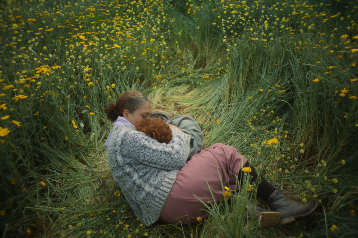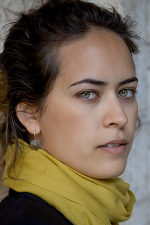

Original name: Mé el Aïn
English name: Who Do I Belong To
Year: 2024
Run time: 117 minutes
Language: Arabic
Type (Colour/ Black & white): Colour
Country: Tunisia, France, Canada
Director: Meryam Joobeur
Producer: Nadim Cheikhrouha, Sarra Ben Hassen, Maria Gracia Turgeon, Annick Blanc, Meryam Joobeur
Cast: Salha Nasraoui, Mohamed Hassine Grayaa, Malek Mechergui, Adam Bessa, Dea Liane, Rayen Mechergui, Chaker Mechergui
Screenplay: Meryam Joobeur
Cinematographer: Vincent Gonneville
Editor: Maxime Mathis, Meryam Joobeur
Sound Designer: Aymen Labidi, Gwennolé Le Borgne, Elias Boughedir, Niels Barletta
Music Composer: Peter Venne
Costume Designer: Salah Barka
Production Designer: Mohamed Ilyes Dargouth
Production Company: Instinct Bleu, Tanit Films
World Sales: LuxBox

Who Do I Belong To is Meryam Joobeur’s debut feature film. Her shorts Gods, Weeds and Revolutions and Born in the Maelstrom both screened at international film festivals. Her Oscar-nominated short Brotherhood was selected by over 150 festivals and won 75 international awards. In her own words, she believes wholeheartedly in the transformative power of storytelling and hopes that her films can capture the beauty, complexity and universal nature of the human condition.
Aïcha is gifted with prophetic dreams. She lives on a farm in northern Tunisia with her husband Brahim and their three sons. Aïcha and Brahim’s world is turned upside down when their two eldest boys, Mehdi and Amine, go off to war. Having lived up to this point solely for their children, the parents now find themselves in a new and painful reality. A few months later, Mehdi returns home with a pregnant wife named Reem whose niqab and silence deeply unsettle Brahim. Aïcha, on the other hand, welcomes Mehdi and Reem into the family home and vows to protect them at all costs. Mehdi’s return triggers strange events in the village. Aïcha is so consumed with protecting her son that, at first, she barely notices the rising fear in the community. She must face the limits of her maternal love to counteract the growing darkness.